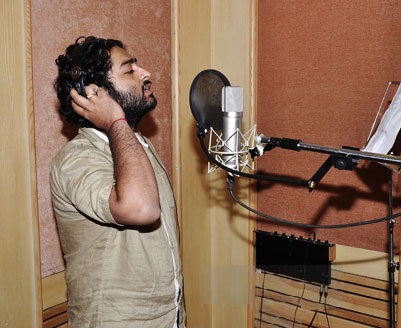The Singing Sensation: Arijit Singh
A profile on the musical genius who started at the age of three, Arijit Singh.

Bollywood Hungama, CC BY 3.0
Here is Arijit Singh attending the GiMA awards.
Most of us have accomplished very little by the age of three, aside from learning how to walk, talk, and eat. Commonly, most people spent their childhood fooling around or doing odd things like mixing soap with shampoo and calling it a science experiment. However, this was not the case for the musical genius Arijit Singh. At only three years old, Singh had already begun his musical training. For the next few years, Singh would be immersed in vocal coaching under the guidance of renowned instructors such as the Hazari brothers.
Rajendra Prasad Hazari, his Indian classical music teacher, Birendra Prasad Hazari, the Rabindra Sangeet teacher, and Dhinredra Prasad Hazari, his tabla teacher, all had a great influence on Singh’s musical life. His strong foundation has allowed him to sing a wide range of songs and further explore his horizons. From the start of his career, he has been grateful to his gurus for the mentorship that they have given him.
In an interview with the celebrated music composer A.R. Rahman in 2020, Singh shared various anecdotes from his time under the instruction of the Hazari brothers. One of the more remarkable ones was how Singh was prohibited from listening to music other than classical music when he was younger. It was to avoid distraction and maintain a musical goal, as the commercial music could have easily influenced Singh, hindering him from establishing his own unique sense of musical style. Speaking on this incident, Mr. Juan Mantilla, a music teacher at Bronx Science affirms, “It’s like a medicine; we all can’t take the same medicine.” Mantilla also said that he understood the situation and it made sense for the teacher to do such a thing, as “it worked for Arijit Singh.”
In the same interview with A.R. Rahman, Singh admitted that despite him being forbidden to listen to mainstream music, at times he has done so secretly. He said that he would save up his pocket money to buy cassettes (Spotify did not exist back then) which brought him closer to music. The patience of getting what you want through exhibiting effort allowed his desire of reaching musical targets to intensify. Even with popular songs of the time, Arijit closely analyzed the songs he was listening to. He would listen and attempt to play the different parts of the song on his Tabla or harmonium. Not only did this ordinary hobby of young Arijit allow him to grow an attachment to music, it enabled him to achieve mastery in several instruments, to reinforce his ear training, and allowed him to get within the numerous layers of any particular song. This was key, as it enabled him to take any musical piece apart or put them back together. In many instances, Singh has also expressed great enthusiasm for making more independent music, and he has certainly made some in the recent years. Even though most of his audience still listen to his Bollywood works, he has published some smaller projects on his YouTube channel.
By the time he was a teenager, he had already participated in numerous nationally televised singing competitions. In one such competition called the ‘Fame Gurukul,’ he caught the attention of the judges and other renowned music composers who recognized his ever-growing talent and love for music. Later some of the same people would offer him opportunities to make a career in Bollywood. Early in his career, he sang ‘Yun Shabnami’ for the film Saawariya under notable filmmaker and composer Sanjay Leela Bhansali.
Unfortunately, due to last-minute changes in the script of the movie, the song was never released but the experience allowed Singh to gain insight on the technicalities of music production. Shortly after he worked alongside composer Pritam, another prominent figure in Bollywood’s music industry. Here he worked on the movie Cocktail’s ‘Tum Hi Ho Bandhu’ and Yeh Jawaani Hai Deewani’s ‘Balam Pichkari’ and ‘Kabira’. In an interview with The Times of India, Singh mentioned “That phase was one of the best things to have happened to me because it helped me grow as an artist. I wanted to be someone who not only has the ability to sing well but also understands all aspects of music.” His passion and dedication for music were clearly seen by the people around him which is why Pritam, the same music composer who Singh has assisted for a long time, later urged him to sing in one of their projects.
This is when and how in 2013, ‘Tum Hi Ho’ came into existence. It was as if Arijit Singh became a singing sensation overnight. That same year, Arijit Singh’s ‘Tum Hi Ho’ was the most popular and streamed Bollywood song of 2013. On several music streaming platforms, he has continuously ranked as a highly streamed artist. In fact, this year he has been the most streamed artist on Spotify in India (and few other regions) for the third year in a row.

(Wikimedia Commons: Creative Commons Attribution-Share Alike 2.0 Generic license.)
After that, there was no looking back for Singh. He sang countless songs, many of which define the era of Bollywood now. Salwa Chowdhury ’24 said, “ He creates songs that have helped many people I know during tough times and even helps the younger generations like us connect with our roots and express our feelings and emotions through a beautiful masterpiece of melodies!” Chowdhury later reveals that she enjoys recent trending songs by Singh such as ‘Apna Bana Le’ and ‘Kesariya’ but also past songs by him like ‘Zaalima’ and ‘Enna Sona.’ In July of 2022, when ‘Kesariya’ first came out, it instantly rose up the global hit charts. It got immense attraction from people around the world, even getting featured in Times Square. Dharma production (the production company of Brahmastra, the movie that Kesariya is a part of) tweeted the news on their official twitter page.
Arijit Singh for me embodies my growing integral love for music. I do not recall how and when I first listened to his music (I grew up listening to the countless songs that he sings). But I know that without his wonderful creations, life would be incomplete. I still cannot comprehend how his music can have so many emotions. At one moment, it makes you feel miserable, and at other times joyous. In today’s generation, “his vocals go crazy”, as Vedika Jain ’24 thinks of it. His vocal range is immensely flexible too, both for high and low notes. Even those who have been trained for years cannot reach his level of mastery.
At times like these, I feel like I have to believe good music only exists through innate talent and not external factors. But Arijit Singh disproves this idea as well. He has shown pure dedication toward this sole skill through countless hours of practice. In an interview, Singh mentioned that he practices every day in the morning, for hours. This is in addition to a packed schedule with recordings, concerts, and other social work.
Despite all this fame, Arijit Singh is a very shy and empathetic individual in his personal life. He rarely attends public events and enjoys staying low-profile. Singh has never been seen using his celebrity status in any manner, and he even normalizes maintaining an ordinary life while being a celebrity. In his community, he has supported institutes for the facilitation of making education and learning more accessible.
Arijit Singh’s voice today unites South Asians across the globe. In a world where arts and commercial purposes have somehow mistakenly crossed paths, Arijit Singh, for many individuals, seems to be the last standing representative of Indian cultural music alive. Even with increased debates about how much westernization and foreign influence is necessary in Indian music, Arijit Singh remains nonplussed. He has the capability to flawlessly sing European influenced songs such as ‘Ae dil hai mushkil’ as much as classical based music. As Mr. Mantilla remarked, there is “something authentic about his voice that blends with the instruments.”
After that, there was no looking back for Arijit Singh. He sang countless songs, many of which define the era of Bollywood now.
Tasnim Haque is the Chief Graphic Designer and Editor-in-Chief of ‘The Observatory’ yearbook. She is also a Staff Reporter for 'The Science Survey.'...










